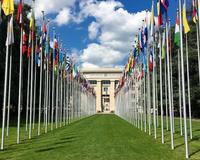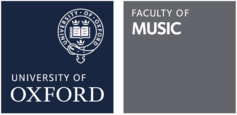Symposium: Music and Diplomacy in the Long Twentieth Century
Please register your place here.

Over the last two decades, international diplomacy has emerged as a key topic in historical musicology. Driven by a renewed interest among music historians in organised politics in general and the Cold War in particular, as well as by the ‘transnational turn’ across the humanities, the resulting scholarship has offered valuable insights into the shifting relationships between performance, aesthetics, ideology, and power.
However, in common with research on cultural diplomacy more generally, the study of musical diplomacy has been limited by a tendency to focus very heavily on the superpower antagonists of the Cold War and especially the US State Department. Consequently, other vital channels of musical diplomacy during the twentieth century, such as those between European states and their (former) colonies, have been neglected. The field has also been held back by a lack of dialogue between musicologists and other scholars working on closely related issues and by a troubling degree of vagueness and inconsistency in the use of certain key terms, not least ‘diplomacy’ itself.
Bringing together scholars from Oxford and beyond, this symposium will both celebrate the vibrancy of this important interdisciplinary research area and explore possible solutions to some of its ongoing challenges. The main aims are as follows:
- To take stock of research on music and diplomacy over the last twenty years;
- To facilitate dialogue and exchange between researchers working on the history and practice of cultural diplomacy from different disciplines and institutions;
- To explore what historical contexts and theoretical issues emerge when the United States is decentred from narratives of musical diplomacy in the twentieth century;
- To investigate the limits of what we can or should refer to as ‘diplomacy’ (as opposed to international relations, transnationalism, or mobility more generally) and to foreground contexts that problematise straightforward assumptions about the ‘inter-’ or ‘transnational’ (such as cultural relations between national units within larger imperial polities).
Please see below for the provisional programme.
The symposium is free to attend, including lunches and refreshments. Please register in advance by 5pm on Tuesday 23 January on this page: https://forms.gle/GbPiYUNU8rwqoUcKA.
In association with the symposium, the artist Jasmina Cibic will be giving a public lecture and film screening at Magdalen Auditorium on 1 February at 5:30pm. See this page.
The symposium is convened by Giles Masters and Bethan Winter, with generous support from the Magdalen College Tutorial Office.
Provisional programme
-
Thursday 1 February
10:15–11: Registration
11–11:15: Opening remarks (Giles Masters and Bethan Winter)
11:15–12:30: State Sponsorship: Possibilities and Limits
- Stephanie Shon (University of Oxford, Music), ‘“A Cultural Identity for Australia in the Eyes of the World”: Selling Australia to Asia in the 1970s through Strategic Musical Diplomacy’
- Zbigniew Wojnowski (University of Oxford, REES), ‘Popular Music and Soviet Cultural Diplomacy in the Global South’
- Friedemann Pestel (University of Freiburg, History), ‘Cultural Diplomacy and Musical World Practices: Some Reflections on Conceptualising Orchestral Touring in the 20th Century’
Chair: Patricia Clavin (University of Oxford, History)
12:30–13:30: Lunch
13:30–14:45: Britain and Russia: Informal Networks
- Pauline Fairclough (University of Bristol, Music), ‘The Mutual Gaze: Russia and Britain during the First World War’
- Jo Bullivant (Royal Birmingham Conservatoire, Music), ‘Unofficial Diplomacy: The Composers’ Guild of Great Britain and the Soviet Union’
- Fiona Jackson (University of Bristol, Music), ‘The Islington Group: the Role of a Community of North London Musicians in Promoting “Unofficial” Soviet Composers’
Chair: Philip Bullock (University of Oxford, MML)
14:45–15:15: Break
15:15–16:30: Spaces and Sociability
- Michael Koenig (University of Oxford, Music), ‘Musical Diplomacy from Within: The Socio-Political Function of British-Made Town Hall Organs across Pre-Federation Australia, c. 1865–1901’
- Stephanie Franklin (University of Oxford, Music), ‘Red Roses and Eye Doctors: Berta Zuckerkandl’s Mission in Switzerland, 1917’
- David Ferreiro Carballo (Complutense University of Madrid, Music), ‘The House of John Milanes during the Spanish Civil War (1936–1939): Music, Diplomacy, and Howitzers’
Chair: Christian Leitmeir (University of Oxford, Music)
16:30–17:30: Break
17:30–19:00: Jasmina Cibic, ‘A Flag, A Song, A Palace’ (public lecture and film screening)
Chair: Nicholas Perkins (University of Oxford, English)
Please see the separate event page here.
Friday 2 February
10–10:45: Registration
10:45–12:00: German Music in the World
- Percy Leung (LJMU, History / University of Oxford, Music), ‘Available Upon Request: The Berliner Philharmoniker’s Diplomatic Concerts During World War I’
- Amanda Hsieh (University of Durham, Music), ‘The Tale of Two Brothers: Hidemaro Konoye and Fumimaro Konoe’
- Elaine Kelly (University of Edinburgh, Music), ‘Music Diplomacy through the Lens of Socialist Assistance: The Case of the GDR and Cambodia’
Chair: Fiona McConnell (University of Oxford, Geography)
12–13:15: Lunch
13:15–14:30: United Nations?
- Giles Masters (University of Oxford, Music), ‘Performing Internationalism: The ISCM as a “Musical League of Nations”’
- Anaïs Fléchet (University of Paris Saclay, History), ‘Tuned into the World: The UNESCO Collection of Traditional Music (1961–1985)’
- Bethan Winter (University of Oxford, History / Music), ‘Reaching the World through Competition: The WFIMC, UNESCO, and the GDR’s International Bach Competition’
Chair: Paul Betts (University of Oxford, History)
14:30–15:00: Break
15:00–16:00: Discussion
Beginning with a response from Mary Ann Smart (University of California, Berkeley, Music)
Image: The Palais des Nations in Geneva (via Wikimedia).



